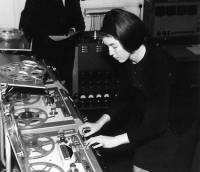Related Research Articles

The BBC Radiophonic Workshop was one of the sound effects units of the BBC, created in 1958 to produce incidental sounds and new music for radio and, later, television. The unit is known for its experimental and pioneering work in electronic music and music technology, as well as its popular scores for programmes such as Doctor Who and Quatermass and the Pit during the 1950s and 1960s.

The BBC Light Programme was a national radio station which broadcast chiefly mainstream light entertainment and light music from 1945 until 1967, when it was replaced by BBC Radio 1 and BBC Radio 2. It opened on 29 July 1945, taking over the long wave frequency which had earlier been used – prior to the outbreak of the Second World War on 1 September 1939 – by the BBC National Programme.

Delia Ann Derbyshire was an English musician and composer of electronic music. She carried out notable work with the BBC Radiophonic Workshop during the 1960s, including her electronic arrangement of the theme music to the British science-fiction television series Doctor Who. She has been referred to as "the unsung heroine of British electronic music", having influenced musicians including Aphex Twin, the Chemical Brothers and Paul Hartnoll of Orbital.
Michael Fenton Stevens is an English actor and comedian. He was a founder member of The Hee Bee Gee Bees and sang the lead on the Spitting Image 1986 number 1 hit "The Chicken Song". He also starred in KYTV, its Radio 4 predecessor Radio Active, Benidorm, and was an anchor on 3rd & Bird on CBeebies.
Marti Webb is an English actress and singer, who appeared on stage in Evita, before starring in Andrew Lloyd Webber's one-woman show Tell Me on a Sunday in 1980. This included her biggest hit single, "Take That Look Off Your Face", a UK top three hit, with the parent album also reaching the top three.

Arena is a British television documentary series, made and broadcast by the BBC since 1 October 1975. Voted by TV executives in Broadcast magazine as one of the top 50 most influential programmes of all time, it has produced more than six hundred episodes directed by, among others, Frederick Baker, Jana Boková, Jonathan Demme, Nigel Finch, Mary Harron, Vikram Jayanti, Vivian Kubrick, Paul Lee, Adam Low, Bernard MacMahon, James Marsh, Leslie Megahey, Volker Schlondorff, Martin Scorsese, Julien Temple, Anthony Wall, Leslie Woodhead, and Alan Yentob.
Victoria Wicks is a British actress. She is known for her role as Sally Smedley in Channel 4's comedy series Drop the Dead Donkey (1990–1998), Mrs. Gideon in The Mighty Boosh (2004), and the College Director in Skins (2007–08). Her film appearances include The Imitation Game (2014) and High-Rise (2015). She is an associate of Howard Barker's theatre company, The Wrestling School.

Whicker's World was a British television documentary series that ran from 1958 to 1994, presented by journalist and broadcaster Alan Whicker.
George Black was a British theatrical impresario who controlled many entertainment venues during the 1930s and 1940s and was a pioneer of the motion picture business.

Maida Vale Studios is a complex of seven BBC sound studios, of which five are in regular use, in Delaware Road, Maida Vale, west London.
BBC Music Introducing is BBC Radio's platform supporting unsigned, undiscovered, and under-the-radar UK music talent. The backbone of that network consists of 32 BBC local radio shows on stations across England and the Channel Islands, various network shows in Wales, Scotland and Northern Ireland, which also give artists the opportunity to be played nationally on BBC Radio 1, Radio 1Xtra, Radio 2, Radio 3, Radio 6 Music and the Asian Network, as well as playing Introducing stages at festivals such as Glastonbury, Reading and Leeds, South by Southwest, Latitude Festival and BBC Radio 1's Big Weekend.
This is a list of events in British radio during 1999.
This is a list of events in British radio during 1987.

Chronicle is a British television programme that was shown monthly and then fortnightly on BBC Two from 18 June 1966 until its last broadcast on 29 May 1991. Chronicle focused on popular archaeology and related subjects, and was considered an influential programme and a landmark in early television presentation of archaeology. The programme was commissioned by David Attenborough in 1966, and was produced by the Archaeological and Historical Unit headed by Paul Johnstone and later edited by Bruce Norman. Among the presenters of the programme were Magnus Magnusson, Colin Renfrew, David Drew, and John Julius Norwich.

Let the Peoples Sing is an international choral competition currently organised by the European Broadcasting Union (EBU). The final, encompassing three categories and around ten choirs, is offered as a live broadcast to all EBU members. The Silver Rose Bowl is awarded to the best choir in the competition.
Before the Fringe was a BBC television series which ran for two series on BBC2 in 1967.
Singing Together was a BBC Radio schools series which ran from 25 September 1939 to 29 March 2001, with repeats until 25 June 2004. Its origins were in Community Singing which was considered necessary at the outbreak of the Second World War following the mass evacuation of children.
This is a timeline of notable events relating to BBC Radio 1, a British national radio station which began in September 1967.
A timeline of notable events relating to BBC Radio 4, a British national radio station which began broadcasting in September 1967.
References
- ↑ "BBC Programme Index". genome.ch.bbc.co.uk. 2020-03-30. Retrieved 2023-08-20.
- ↑ "BBC Programme Index". genome.ch.bbc.co.uk. 1967-07-30. Retrieved 2023-08-20.
- ↑ "BBC Programme Index". genome.ch.bbc.co.uk. 1967-08-06. Retrieved 2023-08-20.
- ↑ "BBC Programme Index". genome.ch.bbc.co.uk. 1967-08-13. Retrieved 2023-08-20.
- ↑ "BBC Programme Index". genome.ch.bbc.co.uk. 1967-08-20. Retrieved 2023-08-20.
- ↑ "BBC Programme Index". genome.ch.bbc.co.uk. 1967-08-27. Retrieved 2023-08-20.
- ↑ "BBC Programme Index". genome.ch.bbc.co.uk. 1967-09-03. Retrieved 2023-08-20.